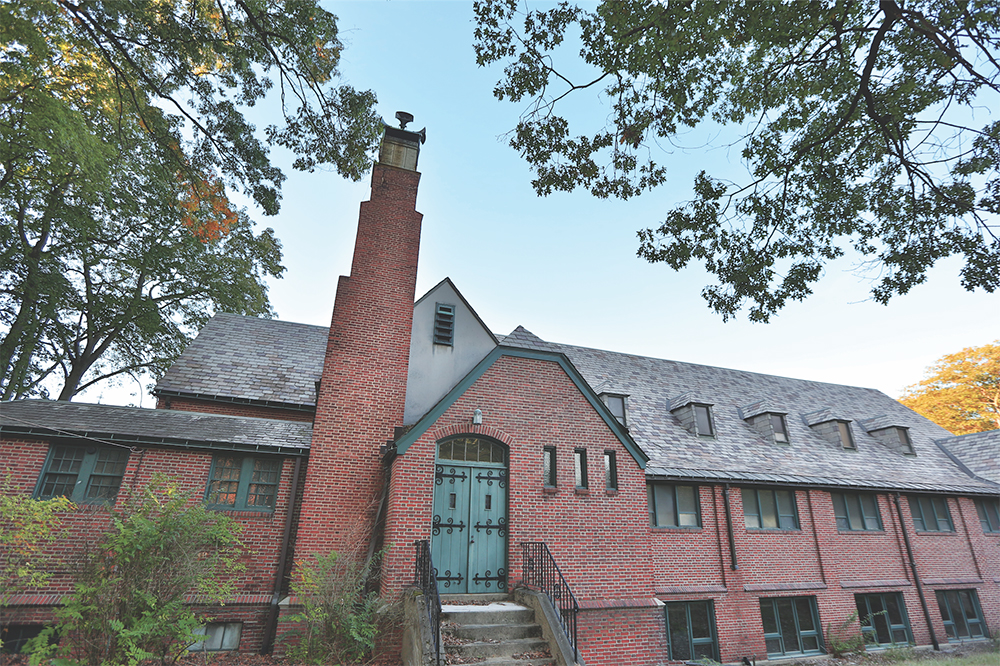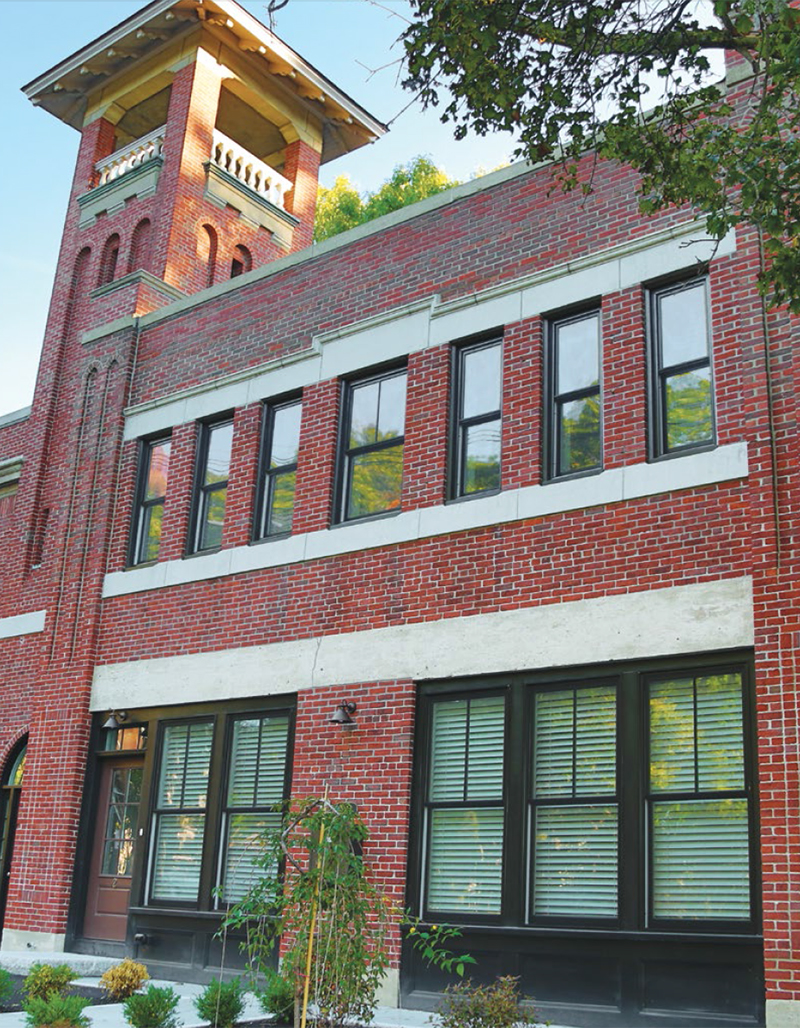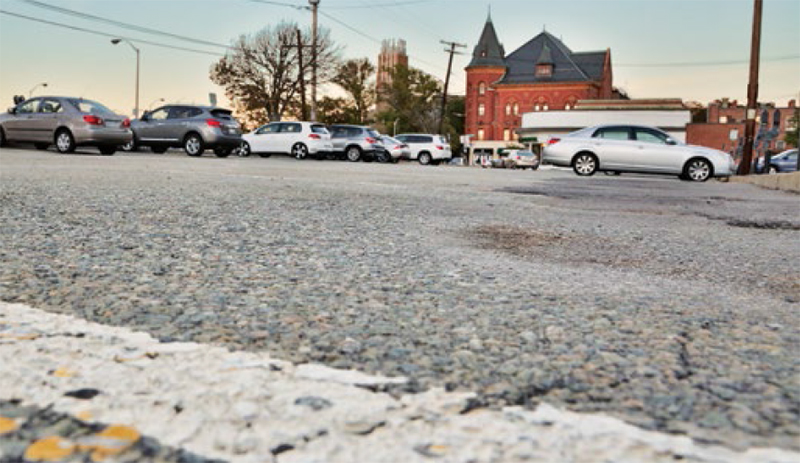By Lauren Gibbons Paul
Photos by Mike Lovett
This article appears in the Winter 2016 issue of Heller Magazine.

St. Philip Neri Church, Waban, Massachusetts. Photo by Mike Lovett.
One evening in September 2013, the Eliot Church in Newton, Massachusetts, held a community forum on homelessness. Last to testify was a large man, who spoke haltingly about the despair of life on the streets. He described how much his life had improved after the Pine Street Inn of Boston found him a place in a safe home. “I’m the luckiest former homeless person in the world,” he said.
That night’s presentation was organized to support a proposal to house nine homeless people in Engine 6, an old firehouse in the tony enclave of Waban, one of Newton’s 13 villages. Soon after the plan surfaced the previous June, the community erupted in discord, with neighbors pitted against each other.
Many said Waban was no place for the chronically homeless, expressing fears that they would prey on children walking to school. Others felt Waban should welcome such an underserved group, especially given the city’s poor track record of creating affordable housing for those of low and middle incomes.
Tatjana Meschede, a Newton resident, decided to attend the presentation at the church after hearing about the controversy. “It was so well done,” she says. “I didn’t see how anyone could object to the Engine 6 plan.” Unlike most of the attendees, though, Meschede was hardly a layperson.
A senior scientist and research director for the Institute on Assets and Social Policy at the Heller School, Meschede has studied homelessness since 1990 and is an expert on servicing and housing chronically homeless individuals. She has repeatedly witnessed the transformation of people who move from the streets to housing with little if any impact on their new neighbors.
“At Heller, we are very involved with what’s happening on the ground. We provide research to support action,” says Meschede. “As a policy researcher, I want to impact policy discussions and policy creation.” Engine 6 presented a perfect opening for action, right in her hometown.
The hue and cry over Engine 6 upset Meschede. “I just couldn’t believe that we could not do better in Newton,” she says. Due to community protest, Newton’s mayor refused to allocate federal funds to the Engine 6 proposal. In response, fair housing supporters filed a complaint with the U.S. Department of Housing and Urban Development (HUD), eventually resulting in a conciliation agreement with the City of Newton. The demise of the Engine 6 proposal galvanized citizens on both sides of the issue and became a watershed moment for Newton’s nascent pro-affordable housing movement.
Newton residents formed a group called Supporters of Engine 6 (often simply called Engine 6) to promote the creation of affordable housing in Newton. Meschede got involved, attending meetings and writing a letter to the local newspaper urging an increase in the number of permanent supportive units for the formerly homeless. But she was aware not all of her neighbors agreed with her stance. “I began to realize that some of my friends were on the other side of the argument,” she says.
The median single-family home price in Newton now exceeds $1 million, putting the city’s housing stock beyond the reach of most. In a place where land itself is so dear, it’s virtually impossible to create affordable housing options, even with federal and state subsidies and the incentives contained in Massachusetts General Law Chapter 40B. Many residents worry more about their own ability to pay increasingly high taxes — a particular burden for the elderly — than Newton’s continuing failure to meet state affordable housing mandates.
“A lot of people are afraid of being priced out, losing a sense of control as to what is happening with this city,” says Meschede. There were knee-jerk reactions. One of the loudest choruses was from people who felt Newton should stay as it is forever. “‘We bought in Newton because we loved Newton — why should anything change?’ It all takes on a life of its own.”
With its elite location and starkly underprivileged target population, Engine 6 was bound to be controversial, but it wasn’t alone. By spring 2014, Newton had already been working for years to redevelop an underused municipal parking lot on Austin Street in Newtonville into a mixed-use property that would contain 17 affordable-housing units along with commercial space, a public plaza and 51 market-rate units. With the end in sight, a group of residents strongly opposed to the project began exploring ways to block it, and nearly succeeded. It was finally permitted in late 2015 but is still the subject of a lawsuit. The Newton Villages Alliance, an anti-development group, was born in the Austin Street fight.
Waban has seen other proposals for mixed-income multifamily housing development in the past two years. Progress has been slow at best, in part due to the city invoking a procedural challenge to Chapter 40b. Neighborhood protest has flared up again, stoking the same irrational fears of living near lower-income residents. (“They’ll throw old mattresses out the window,” said one attendee at a public meeting to discuss a potential development at the St. Philip Neri Church in Waban.)
In 2014, as the noise level surrounding affordable housing in Newton grew louder, progress seemed slower than ever. Newton’s newly released housing strategy calls for the creation of 800 affordable units by 2021. But since 2010, only 18 have been created, with another 33 on the way. As it turned out, Meschede was not the only Heller researcher (and Newton resident) whose research and personal passion has been instrumental in helping pro-affordable housing efforts on the ground.

Engine 6 firehouse in Waban, Massachusetts. Photo by Mike Lovett.
Heller fair housing expert gets involved
Dolores Acevedo-Garcia, director of the Institute for Child, Youth and Family Policy at Heller, is a nationally recognized researcher on racial/ethnic inequity and the key role that residential segregation plays in reinforcing it. She became involved with Engine 6 after witnessing residents’ strong resistance to a proposal for a group home in Newton Centre for young people with intellectual disabilities. As a long-term fair housing advocate, she was struck by the vicious opposition to these proposals as well as Newton residents’ ignorance about the city’s obligations under fair housing law.
Acevedo-Garcia, a Waban resident, was particularly alarmed to see the themes of exclusion and unfairness from her research happening literally in her own backyard. “My work has been at the metropolitan and national levels. It was horrible to see how the things I have studied were playing out right where I live. I decided to start working here in Newton,” she says. “I have done a lot of work on the negative effects of housing segregation and the lack of affordable housing, especially in communities with high opportunity levels,” says Acevedo-Garcia. In September 2016, her research team collaborated with The Boston Globe on a front-page article titled, “Boundaries to hope: In Greater Boston, a lopsided geography of affordable housing.”
Acevedo-Garcia’s role in working with Engine 6 is to share key research highlights with the group and to attend the at-times explosive public meetings to speak in favor of specific affordable housing projects in Newton. She writes letters to the editor, pens blog posts and editorials, and starts conversations with her neighbors.
From the beginning, the group voraciously consumed Acevedo-Garcia’s knowledge and perspective, welcoming her onto its steering committee. According to Engine 6 leader and employment attorney Lynn Weissberg ’69, “[Acevedo-Garcia] brings an academic perspective to the work we are doing. That is very important because she understands how these issues have been fought in other communities. She is good at reminding us there is another world out there. We’re not the first to be fighting these fights.”
Engine 6 co-founder Kathleen Hobson goes further. “[Acevedo-Garcia] has raised our sights and changed the conversation. Engine 6 began as a group of self-interested Newton neighbors talking amongst ourselves, posing as experts but mostly reacting emotionally to negative stereotypes about homeless people,” says Hobson. Acevedo-Garcia’s work gives the group courage and lends its advocacy credibility and authority, she adds.
Acevedo-Garcia has sharpened her focus thanks to her work with Engine 6. While as an academic she understood the strong correlation between fragmented municipal governance and segregation, her work on the ground with Engine 6 has given her a better understanding of how this plays out.
Says Acevedo-Garcia, “I have become much more aware of the role of governance in perpetuating exclusionary regulations and allowing anti-affordable housing groups to influence housing decisions. The fact that it is easy for neighborhood groups to band together to lobby their ward representatives — which happened in opposition to the Engine 6 proposal — makes the situation difficult.”
In the aftermath of the Engine 6 proposal, some residents commented on the online forum Village 14 that the city was right to give in to neighborhood animus against the incursion of the chronically homeless. This makes Acevedo-Garcia shake her head.
“Recent court decisions in New York and Arizona made it clear this may constitute a violation of federal fair housing law. The market rules a lot of things, but thankfully there are limits that have been set to remedy historical and current discrimination in housing,” she says. Bowing to neighborhood pressure to kill a proposal is impermissible for cities like Newton that receive federal funds to help create fair and affordable housing.

Austin Street parking lot in Newtonville, Massachusetts. Photo by Mike Lovett.
Funding the creation of more equitable communities
Newton resident Susan Eaton, director of the Sillerman Center for the Advancement of Philanthropy at the Heller School, has also been involved in fair and affordable housing efforts since Engine 6. Eaton studies responses to demographic change in a variety of communities across the country.
“It’s hard to go up against the old way of thinking,” says Eaton. “There is a tremendous resistance to change, especially in exclusive, upper-middle-class communities like Newton.” Without support for agents of change, there is a danger that residents will assume no one cares about affordable housing.
Eaton applauds organizations like Engine 6 that are trying to create more equitable communities. “There is actually a really large number of people in Newton who think like that. But they have to be organized. These groups need resources to thrive and grow.”
Preparing the next generation of housing advocates
Soo Laski was a Heller student and Waban resident when the flap over Engine 6 erupted. Laski went to several public meetings but stopped short of joining the Engine 6 group when her father, Frank Laski, became its attorney. Then she received an assignment to get involved with a community advocacy group for her Policy Advocacy and Community Organizing class at Heller. Naturally, her thoughts turned to Engine 6.
“I saw the pushback against the Engine 6 housing [proposal] as pushback against diversity, affordable housing and the needs of vulnerable individuals and groups in our society,” says Laski, who earned an MS in global health policy and management and an MA in sustainable international development from Heller last May.
In September 2015, Laski testified at Newton City Hall in favor of diverse and affordable housing during the Austin Street special permit hearings. “I testified as a millennial living in Newton for many years. I was in that spot where I was thinking about where I am going to live and how I am going to move on from graduation,” she says.
Having grown up in Waban watching house prices climb ever higher, she wondered where she could afford to live after graduation. With no available rental units and housing prices in the millions, her hometown was not a viable option.
“I’d love to live and work in the Boston area, but how am I going to do that?” says Laski. She credits her education at Heller with feeding her passion for working on social justice issues. “Heller gave me the tools, skills and knowledge to actually work on affordable housing,” she says.
The Austin Street project was approved in December 2015, a decisive win for affordable housing advocates in Newton. Since then, wins have been few. Newton remains divided on the issue. Many believe that housing should be restricted to those who can afford it.
Obstacles are generally fewer in less-pricey communities, says Meschede. She recalls a project she worked on years ago in Quincy, Massachusetts, that reminds her of Engine 6. They were able to house 10 formerly homeless people in a similar property. There was just one catch: It was a crack house before it was developed as housing for the homeless.
Lesson learned? “Tear down a crack house, and use that as homeless housing, and the neighbors will be very happy,” she says ruefully. Time and time again, Meschede has encountered communities with vocal opposition when disadvantaged people move in. Then weeks go by, and everything normalizes. After a while, no one remembers there was ever an issue.
Asked if it gets discouraging when progress is so slow, Meschede shrugs. “I continue to try,” she says.
